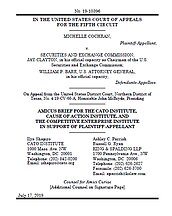In April 2016, the SEC commenced an enforcement proceeding against Michelle Cochran for alleged violations of federal accounting regulations. The proceeding took place before an administrative law judge who was reported at the time to have said to defendants that “they should be aware he had never ruled against the agency’s enforcement division.” True to his word, the SEC judge issued an initial decision ruling in the SEC’s favor. Ms. Cochran was fined $22,500 and banned from practicing as an accountant for at least five years. But before the SEC could finalize its order against Ms. Cochran, the Supreme Court ruled in Lucia v. SEC that administrative law judges are “inferior officers” subject to the Appointments Clause. Because SEC judges had not been appointed by the “President alone…Courts of Law, or…Heads of Departments”—as required by Article II—the Supreme Court invalidated all ongoing administrative enforcement proceedings before the SEC, including the one against Ms. Cochran.
After Lucia, the SEC attempted to cure this constitutional defect by “ratifying” its administrative law judges’ prior appointments. The problem is that by addressing its Appointments Clause violation, the SEC is forced to violate the Constitution’s Removal Clause. In Free Enterprise Fund v. PCOB, the Supreme Court held that “officers” of the United States may not be insulated from presidential control by more than one layer of tenure protection. Yet the SEC’s judges enjoy employment protections, and they are removable by SEC commissioners, who also enjoy employment protections. That is, the SEC’s administrative law judges are “officers” with at least two layers of tenure protections, and, therefore, run afoul of the Supreme Court’s reading of the Removal Clause in Free Enterprise Fund.
In its Lucia brief, the SEC acknowledged this constitutional quandary. Notwithstanding this concession, and although the SEC has the discretion to bring its enforcement proceedings in an original action before an Article III court, the agency reassigned Ms. Cochran’s case to a new administrative law judge. As a result, the SEC knowingly subjected Ms. Cochran to a second unconstitutional enforcement proceeding, which remains ongoing.
Enough is enough. In January, with the help of the New Civil Liberties Alliance, Ms. Cochran filed suit against the SEC in a federal district court in Texas. She argued that she should not have to undergo a second unconstitutional enforcement proceeding. To be clear, she’s not asking the court to void the SEC’s charges against her or otherwise diminish the SEC’s enforcement power. Ultimately, Ms. Cochran seeks only for a federal court—and not an unconstitutional administrative law judge—to try the SEC’s case against her.
On March 25, 2019, the district court dismissed her case for lack of subject-matter jurisdiction, concluding that Congress intended to preclude district court jurisdiction over Ms. Cochran’s constitutional claims and channel those claims through the administrative process. Ms. Cochran has appealed the district court’s order to the U.S. Court of Appeals for the Fifth Circuit.
The Cato Institute, joined by the Cause of Action Institute and the Competitive Enterprise Institute, today filed a brief in support of Ms. Cochran. We argue that the district court misconstrued (and thereby trivialized) Ms. Cochran’s serious ongoing constitutional injury. In addition, we argue that parties like Ms. Cochran may never get any opportunity to seek or obtain redress for their constitutional injury, and even if they do it will be too late to undo or remedy the injury. Because this case alleges a colorable constitutional claim of ongoing ultra vires government action, and because Congress cannot have intended to strip district courts of jurisdiction over such a claim, the Fifth Circuit should allow Ms. Cochran’s case to proceed in the district court.

